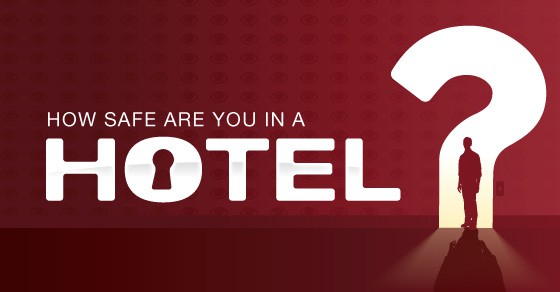
The recent court case involving sportscaster and TV personality Erin Andrews served to expose some of the dangers of travel and hotel security that most of us don’t consider.
If you’ve ever lost a hotel room key card and had to go to the front desk to get a new one made, you might have been asked to show some ID before receiving a new one. As inconvenient as that may be, there is a good reason for it: there is a substantial burden on hotels and their staff to provide security and privacy for their guests.
In 2008, Andrews checked into a hotel in Nashville, Tennessee, near Vanderbilt University, in preparation for her job reporting on a Vanderbilt football game for ESPN. Unbeknownst to Andrews, a stalker had managed to check into the same hotel, learn her room number, and request a room next door to hers. The stalker altered the peephole of Andrews’ door and recorded several minutes of footage of the sportscaster inside her hotel room. The resulting video footage of Andrews, nude, found its way onto the Internet and touched off a storm of controversy regarding hotel safety and the responsibility of hoteliers to their guests.
Negligent Security
Guest safety and security has long been an issue in the hotel industry. Most hotel chains have stringent standards in place to protect the privacy and security of their guests – just think of the process you must undergo to receive a replacement key card or contact another guest in the same building. Properly trained staff will not divulge room numbers or provide a replacement key card without proper identification. However, even properly trained staff can make mistakes, exposing a hotel guest to danger.
Just how easy is it for someone to learn your hotel room number or request a room near yours, without your consent? The Today Show’s Jeff Rossen put that question to the test and discovered that in many cases, it’s all too easy.
While the term negligent security is generally understood to encompass such issues as the physical security of a property, negligence can be claimed in such a case, as well. By departing from hotel safety guidelines and providing information about you without your consent, the hotel has made you more vulnerable to potential crime.
Tips to Protect Yourself
Checking into a hotel is something that most of us do without much thought for our personal safety, particularly if it’s a more upscale establishment. But there are things you should consider when checking in, regardless of how nice the hotel is; hotel crimes are often crimes of opportunity, and you never know who may be watching you or listening to your conversations with the intent of harm.
- Ask the front desk personnel not to announce your room number, but instead write it down. If they verbally tell you your room number, ask for a different room and request that number to not be announced.
- Keep your luggage between you and the front desk when checking in.
- Do not leave your credit card lying on the front desk counter, and double-check that the card being returned to you by the clerk is indeed your card.
- When registering, sign with only your first initial and last name – for women traveling alone, this does not indicate gender.
- Instruct the front desk not to give out your name or your room number, and request them to call you if anyone inquires about you.
- When checking in, grab a couple of business cards from the front desk; keep one near the room phone and one with you. If you need the address of the hotel for contacting emergency services or for a cab ride, you will have it handy.
- Ask for a room between the 3rd and 6th floors. Ground floor and second floor rooms are more accessible to would-be criminals, and rooms higher than the 6th floor may be out of reach of fire truck ladders.
- Upon entering your room, examine such things as window locks, door deadbolts, and peepholes. Check closets and bathroom to see if anyone may be hiding inside.
- Never prop your door open, even for a moment; do not use the deadbolt as a door stop.
- If someone knocks on your door, confirm their identity through the peephole before opening the door; if they state they are hotel staff, contact the front desk to ask if someone has been sent to your room, and for what purpose.
- If you receive a phone call in your room from someone stating to be with hotel staff and requesting entry into your room to make a repair, contact the front desk to confirm.
Ultimately, the $55 million that Andrews was awarded is less about the money – indeed, Andrews may never see payment of the full amount – than it is about the efforts that hotels must make to protect their guests. Because human error is a factor in such circumstances, hotel guests must take precautions for their own safety.
If you’ve experienced a breach in hotel security, you may benefit from speaking with an attorney experienced in negligent security cases. Your attorney can examine the facts of the situation and determine if you need assistance in preserving your legal rights.
